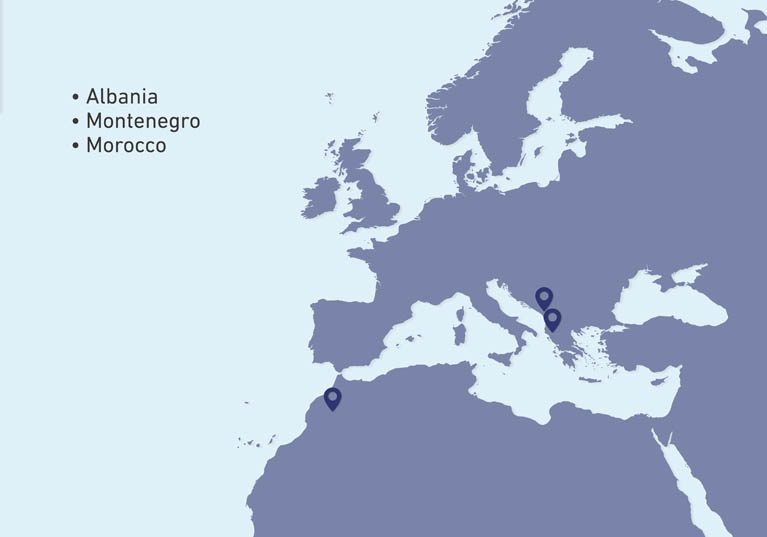
The WoRTH Project : Women’s Right to Health
Context and objectives
The WoRTH project aims to reduce the incidence of and mortality from breast and cervical cancers in Albania, Montenegro and Morocco, through a comprehensive screening strategy. It will be developed in accordance with national public policies and in close coordination with national health authorities and local healthcare practitioners.
The growing impact of breast and cervical cancers on the 15 countries of the Southern and Eastern shores of the Mediterranean is a major concern. In these countries, incidence and mortality rates of both cancers have been increasing over the past decades. Every year, over 212,000 women are diagnosed with breast cancer, and 19,000 with cervical cancer, while 62,200 and 7,800 respectively succumb to the disease.
With a budget of €4.16 million over 4 years, this project encourages the introduction of a multidimensional and gender-sensitive approach to cervical and breast cancer prevention, focusing on existing policies and delivered services (e.g. primary healthcare facilities, family planning clinics, etc.). The overall aim is to reduce delays to cancer diagnosis and premature deaths, as well as the socio-economic impact of cancer. The project will also encourage in-country and regional cooperation through a cancer-prevention network. This will foster the exchange of information, best practices, and cancer prevention strategies tailored to local realities.
Within the scope of the project, over 45,000 disadvantaged women (aged 25-65) are expected to be tested for cervical and breast cancer and to be educated on the importance of cancer prevention, and more than 300 healthcare professionals and other stakeholders involved in early detection/screening programmes will be trained.
Location

Key figures
Duration:
2016–2020
Beneficiaries:
45K women
Total cost:
€ 4.16M
Countries:
3
Financial contribution
€455,500 – Promoter
€400,000 – Participating countries
€100,000 – The Italian Ministry of Health
Promoter
The Centre for Epidemiology and Prevention of Cancer in Piedmont (CPO) is the lead promotor and has 20 years’ experience in cancer prevention, collaborating with national and international organisations (the World Health Organisation, the International Agency for Research on Cancer, and the European Commission). In May 2014, the CPO was named a WHO Collaborating Centre for Early Detection and Screening of Cancer.
Key partners
Ministry of Health Albania
Ministry of Health Montenegro
Ministry of Health Morocco
Beneficiaries
Women, particularly disadvantaged women living in vulnerable situations, who will be given free access to cancer screening.
National ministries, healthcare professionals and other relevant stakeholders, in particular those working in detection/screening programmes.
Civil society and women’s associations that are committed to women’s health.
Key actions
Analyses of national contexts to assess economic, social and epidemiological conditions and the legal framework for planning and implementing a suitable early cancer detection programme.
Development of national networks of decision makers, healthcare professionals and community organisations active in cervical and breast cancer control.
Implementation of a multidimensional cervical and breast cancer early-detection programme for the benefit of disadvantaged women in two different areas in each country (urban and rural), through the DNA Human Papilloma Virus test and clinical breast examinations.
Raising awareness among women on the risks of cervical and breast cancer.
Training of healthcare professionals and other relevant stakeholders (e.g. decision makers) involved in early detection/screening programmes.
Strengthening Mediterranean networks of cervical and breast cancer screening programmes to promote research and cooperation.
Results
National diagnostics on cervical and breast cancer screening.
45,000 women will be offered a test for cervical (25-65 years old) and breast (40-65 years old) cancer and will be made aware of the risks and the importance of prevention.
At least 15 training sessions for more than 300 beneficiaries including policy makers, healthcare professionals and other relevant actors, as well as 12 tutoring actions and several training activities offered by EU centres dealing with cancer prevention and screening.
National networks of decision makers, health professionals and active community bodies will be created.
Existing Mediterranean networks for the early detection and screening of cervical and breast cancer will be strengthened.
